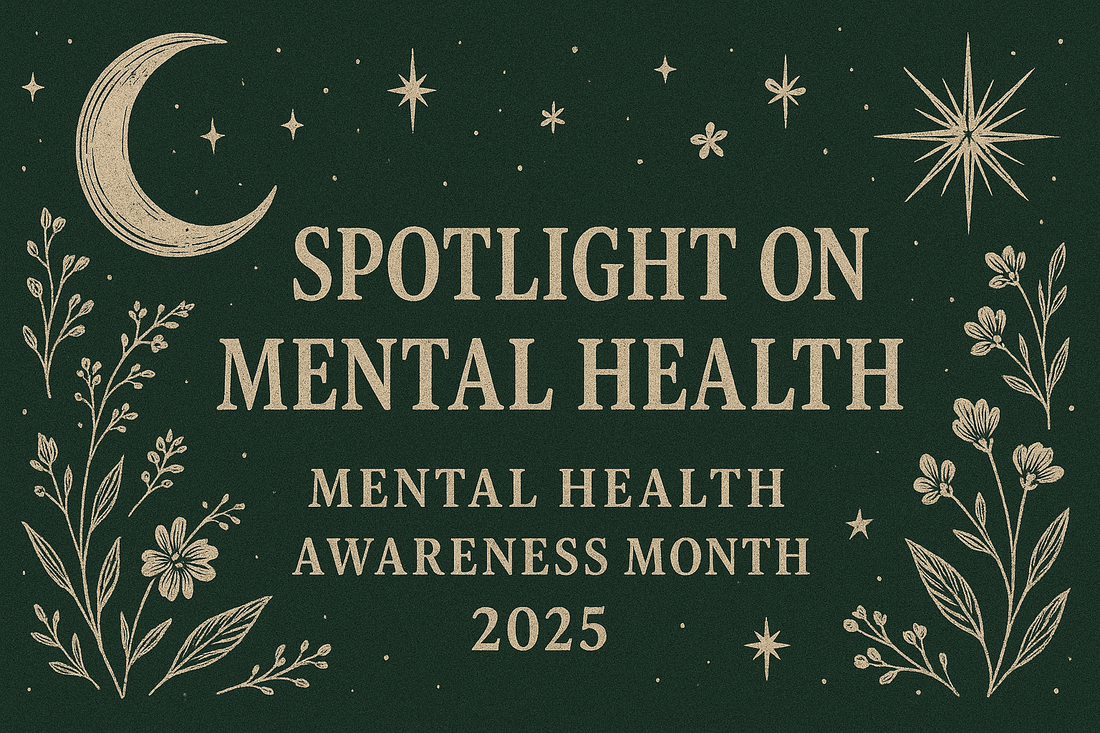
Spotlight on Mental Health: Why We Speak Up – Our Family’s Mental Health Journey
Why We Speak Up: Our Family’s Mental Health Journey
Week 1 of the Mental Health Matters series
⚠️ Content Warning: This post includes candid discussion of PTSD, childhood trauma, depression, mental health crises, parental burnout, and emotional abandonment. Please read with care and honor your own capacity today.
For a long time, I thought I had already survived it.
The trauma. The chaos. The damage.
I knew I was broken in places, but I also thought I had made it through—like I had paid my dues to suffering and earned some kind of peace. So when Jon came home from the military carrying the weight of war, I poured everything I had into his healing. His PTSD, his pain, his unraveling—it became my mission. I told myself I was strong enough to hold it all.
And maybe I was, for a while.
But years into his mental health battles, we were invited to a Wounded Warrior retreat in Lake Tahoe. I remember sitting in a circle listening to spouses share how hard it was to live with someone traumatized by war. How they lost themselves. How they felt invisible. How they had become shells of who they once were.
And I got angry.
I sat there thinking, “I’m not bitter. I chose this. I’m here to support my husband. I’m FINE.”
But I wasn’t.
Not really.
Because sometime after that anger settled into my chest, I broke down.
I had what felt like an emotional collapse—for no obvious reason. But now I know it was the dam breaking. The flood of everything I had shoved down in doormat mode for years. The self-sacrifice. The silence. The belief that I didn’t matter because someone else needed help more.
That moment cracked me open. It was the beginning of a long, painful reckoning with my own story—one I’d been too busy surviving to fully process. I couldn’t ignore my damage anymore. I had to face it, name it, and finally let it heal.
While I was burying my own pain beneath the role of caretaker, Jon was walking his own path through trauma—one that started not in childhood like mine, but in service to his country.
We were already married for two years when Jon joined the Army. I was pregnant with our second son, and he was born while Jon was still in AIT. Our marriage came first. The military came later. But once it entered our lives, it changed everything.
His first duty station was Fort Sill, Oklahoma. It didn’t take long for the pressure to mount. Jon was placed under a toxic leader who outright told him he’d never make sergeant while working for him. But Jon pushed forward anyway. As a light-wheeled vehicle mechanic, he fought his way up from the bottom and earned his E-5 despite everything stacked against him.
Then came Iraq.
His first deployment took him overseas—and when he came home briefly on leave, I got pregnant again. I gave birth to our daughter while he was gone. Again.
When she was just five months old, we moved to Hawaii. Jon had just come home from deployment—we had barely begun to settle into family life again. He brought us there in March, and by Memorial Day, he was gone. Again. He had only been back for four months.
Hawaii was supposed to be a reprieve. A fresh start. But it quickly became another battlefield—just a quieter one.
I stayed in Hawaii for three years.
Jon was there for only a year and a half.
He left me there with three children under five, in a place I didn’t know, on an island where I had no support system, no family, no familiarity—just the weight of everything. I didn’t know the roads, the culture, the people. I was completely alone. Every day was survival mode, juggling babies and breakdowns and figuring it all out by sheer force of will.
After Jon’s second deployment, the cracks really started to show. He began experiencing memory loss. Not just forgetfulness, but something deeper—like pieces of him were slipping away. It was subtle at first, but unmistakable. Something had changed.
After 10 years of service, Jon left the Army—and we assumed life would get easier. But the transition was brutal. The VA failed us. For three long years, they didn’t pay him. They didn’t help him. They left us to figure it out alone.
During that time, Jon experienced multiple severe mental health episodes. The first time, he was taken to the hospital, where he got some of the care he needed. The second time, the response was different. He was taken to jail instead.
Meanwhile, doctors threw pills at him—medications meant to “level him out,” but in reality, they just made him numb. He was there, but not present. It took years of trial and error to finally find a combination of medications that helped, along with the right balance of structure and daily activity to keep him steady.
But the truth is—he still struggles.
Every day.
Living in a world that wasn’t built for people like him.
Parenting Through the Aftershocks

The military may have issued Jon’s orders, but our whole family lived in the fallout.
The impact on the kids was immediate. Our oldest—who at the time was still undiagnosed but clearly autistic—was already on medication for hyperactivity and risky behavior. Our middle son showed clear signs of abandonment issues, even as a toddler. They were just babies, but I could see the cracks forming even then.
They’re in their twenties now, and I still catch glimpses of those two hurting little boys inside them. Trauma doesn’t leave quietly—it echoes.
Our youngest doesn’t remember Hawaii, but the sensory issues began there. And by the time we made it back home, the meltdowns had become severe. It was like the emotional undercurrent of everything we were carrying had seeped into her nervous system too.
And the truth is, I wasn’t okay either.
We got married at 18. Had two kids by 20. I had no coping skills. I didn’t know how to regulate my own emotions, let alone model that for my children. During Jon’s second deployment, I was so depressed I became physically ill. My body was collapsing under the weight of what I couldn’t say out loud.
And in that fog—I was abandoning them too. I was there, but I wasn’t present.
It breaks my heart to write that, but it’s the truth. It wasn’t okay. I wasn’t okay.
It took until our oldest was 11 to finally get an autism diagnosis. He’s high functioning, so it took years for doctors to stop brushing it off. But by fifth grade, he emotionally regressed so hard it couldn’t be ignored anymore. The truth had been there since birth—we were just waiting for the system to catch up.
People sometimes ask how I made it through those years, and the truth is—I don’t really know. I don’t know how I survived it. And when I look back, I’m not even sure I could do it again.
But here’s what I do know now:
I made mistakes.
Big ones.
But it’s not too late.
It’s never too late to teach your kids how to emotionally regulate. It’s never too late to introduce healthier habits, better coping mechanisms, or a new way of being in your home. If you want to heal what’s broken, you can. That doesn’t mean everything should be “fixed”—some things need boundaries, not forgiveness. But healing is always an option. It’s always a choice.
And that’s what we’ve been doing ever since—choosing healing, one imperfect day at a time.
Where We Are Now
We are miles from where we were when Jon left the Army.
We are even further from the place I was in four years ago, when my own trauma came roaring back like wildfire.
Things aren’t perfect. They never will be. But we are healing. We are learning to be present. We are learning to speak up before the breakdown. We are raising children who now see us doing the work—and slowly, they are learning how to do the work, too.
We’re not just surviving anymore.
We’re rebuilding something new, together.
If you’re somewhere in the middle of your own storm, we want you to know: you’re not alone. There is no shame in struggle, and no timeline for healing. What matters most is that you keep reaching for it.
One breath at a time.
One boundary at a time.
One imperfect, courageous day at a time.
With love and honesty,
Carol & Jon
Green Magick Apothecary
